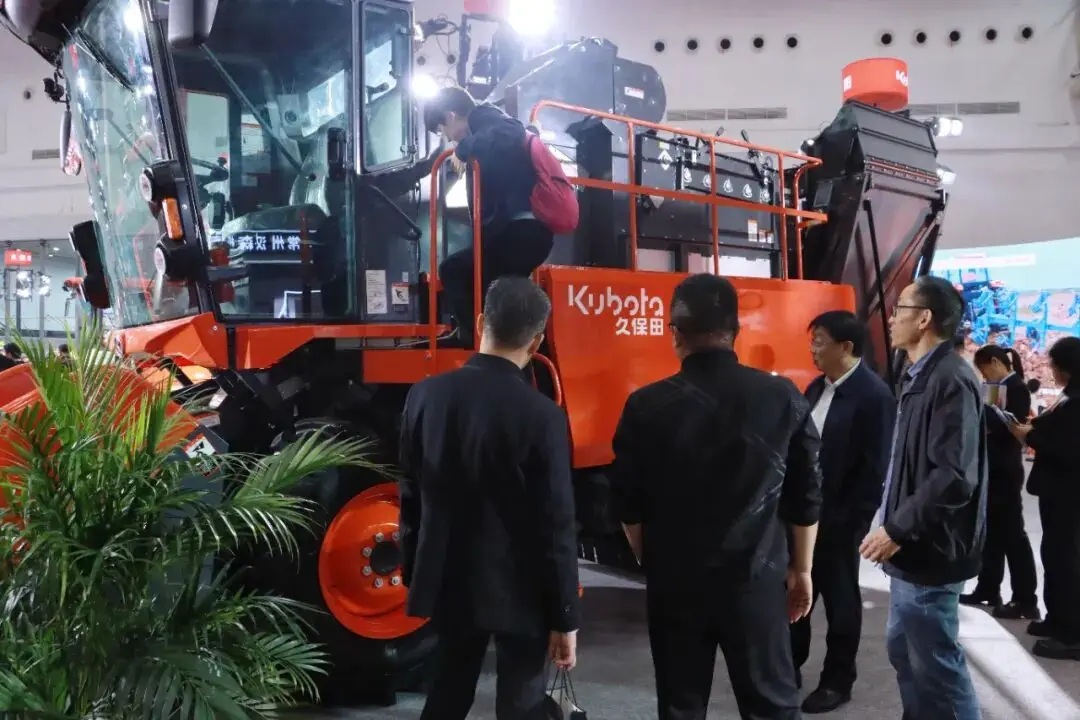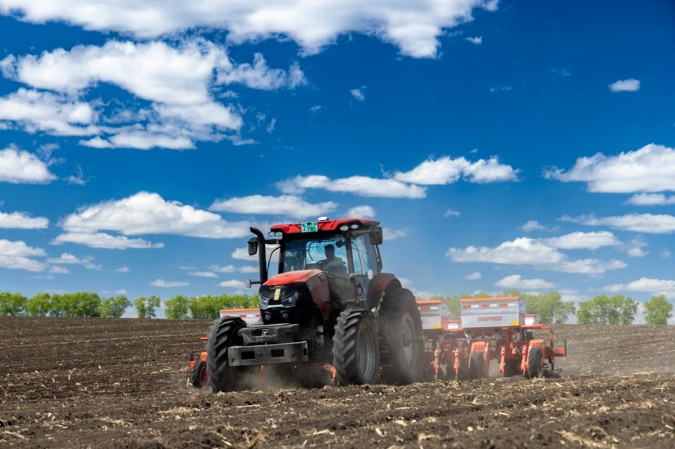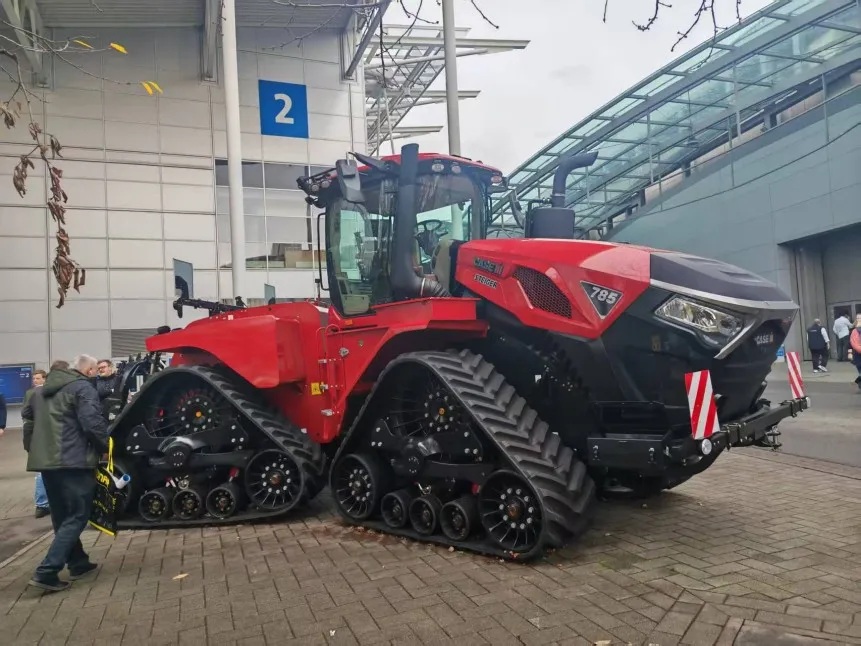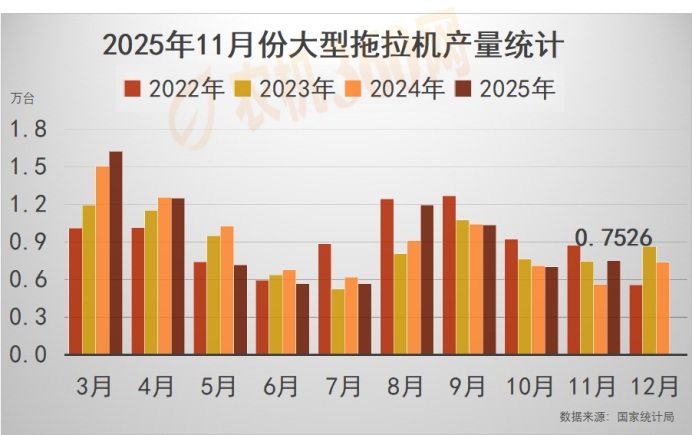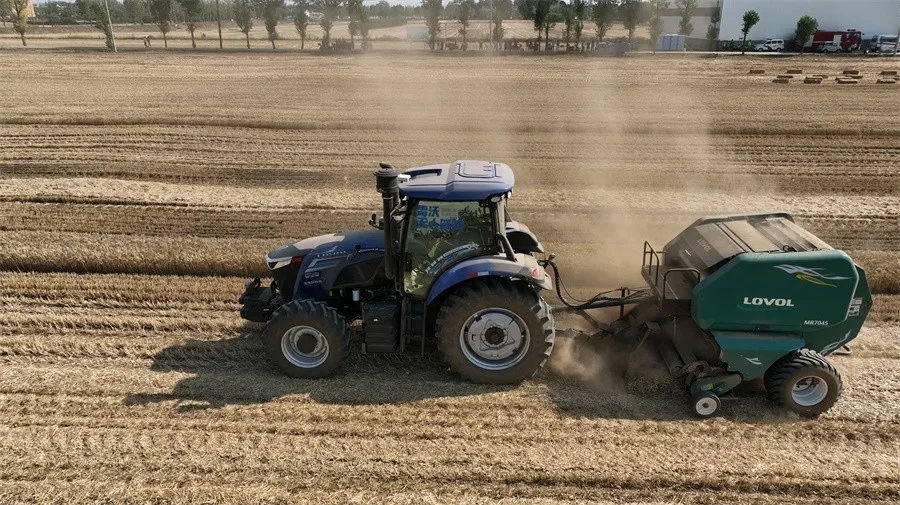The 2025 Youth Science and Technology Workers Intelligent Agricultural Machinery Equipment Technology Development Forum is held
On March 22nd, the 2025 Youth Science and Technology Worker Intelligent Agricultural Machinery Equipment Technology Development Forum, jointly hosted by the China Agricultural Mechanization Association and the Nanjing Agricultural Mechanization Research Institute of the Ministry of Agriculture and Rural Affairs, organized by the editorial department of the Journal of Intelligent Agricultural Equipment (Chinese and English) and the Agricultural Machinery Science and Technology Branch of the China Agricultural Mechanization Association, and co organized by the Jiangsu Agricultural Machinery Society, Jiangsu Agricultural Engineering Society, the School of Artificial Intelligence at Nanjing Agricultural University, the School of Agricultural Equipment Engineering at Henan University of Science and Technology, and the Youth Work Committee of the China Agricultural Machinery Society, was successfully held in Zhumadian, Henan Province.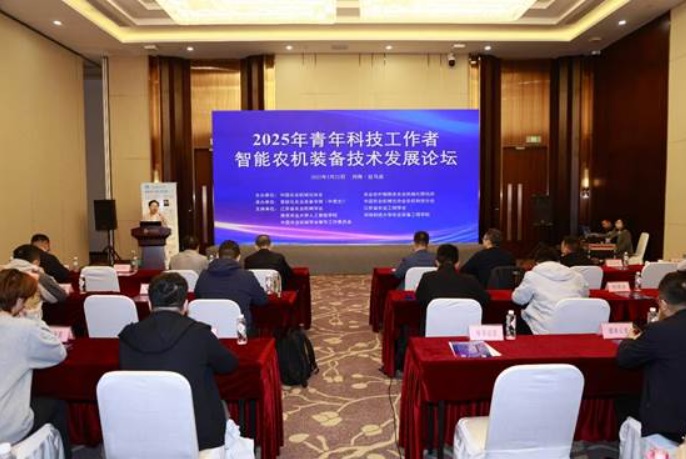
On site forum
The forum focuses on social hot topics such as young scientists, intelligent agricultural machinery and equipment, technological innovation and application, with the core theme of "Technological Innovation and Application of Intelligent Agricultural Machinery and Equipment". It covers key application scenarios of intelligent agricultural machinery and equipment such as new energy power machinery, fields, facilities, livestock and poultry, aquatic products, and processing, aiming to promote academic exchanges and technological innovation in the field of intelligent agricultural machinery and equipment, stimulate the vitality of young scientific and technological talents, accelerate the application of scientific and technological achievements, and empower the high-quality development of modern agriculture. Vice President Liu Hengxin and Minister Li Xueling of the China Agricultural Mechanization Association, Deputy Director Zhu Lihao of the Agricultural Mechanization General Station of the Ministry of Agriculture and Rural Affairs, Deputy Researcher Wang Shuo and Deputy Editor in Chief Zhang Jinlong of the Nanjing Agricultural Mechanization Research Institute of the Ministry of Agriculture and Rural Affairs, and more than 100 representatives from research institutes, universities, and enterprises across the country attended the conference. More than 40000 people watched the forum live broadcast online simultaneously. The meeting was chaired by Wang Yingkuan, a researcher at the Planning and Design Institute of the Ministry of Agriculture and Rural Affairs and Executive Secretary General of the Chinese Society of Agricultural Engineering.
In his speech, Liu Hengxin, Vice President of the China Agricultural Mechanization Association, pointed out that this forum is a measure to implement General Secretary Xi Jinping's instructions on "cultivating a large-scale team of young scientific and technological talents, focusing on the policy of cultivating national strategic talents, and supporting young talents to shoulder the main role". It is a platform for the exchange of intelligent agricultural machinery and equipment technology, as well as a stage for young talents to demonstrate their innovative power. He stated that the current intelligent agricultural machinery equipment has ushered in unprecedented development opportunities, but also faces many challenges. The purpose of holding this event is to enable young scientific and technological workers to share the latest research results in intelligent agricultural machinery innovation, promote technical exchange and mutual learning, promote collaborative innovation between industry, academia, and research, strengthen cooperation, and help young scientific and technological workers grow, apply their scientific research achievements, and promote the development of intelligent agricultural machinery equipment.
Professor Lu Mingzhou, Vice Dean (in charge) of the School of Artificial Intelligence at Nanjing Agricultural University, delivered a report titled "Research and Application of Intelligent Technology and Equipment for Livestock and Poultry Breeding". He pointed out that modern animal husbandry in China has obvious characteristics of intensification and scale, and intelligent technology and equipment have become the key driving force for the development of the industry towards green, efficient, and healthy breeding. Real time control of the breeding environment is realized through the Internet of Things system, which relies on computer vision and voiceprint analysis technology to accurately identify the individuals/groups of livestock and poultry with abnormal health, constructs a precision feeding system combined with the dynamic nutrition model, and deploys robots such as patrol inspection, dung cleaning, disinfection and sterilization to complete breeding operations. The application of intelligent technology and equipment not only significantly improves the feed conversion rate and operating efficiency, but also helps to improve the health and welfare level of livestock and poultry. Effectively promote the formation of a sustainable development model for animal husbandry that is resource efficient, environmentally friendly, and has controllable quality.
Professor Jin Xin, Dean of the School of Agricultural Equipment Engineering at Henan University of Science and Technology, gave a report titled "Efficient Harvesting Technology and Industrialization of Oil Sand Beans". As an economic crop that integrates grain, oil, and feed, oil sand beans have the characteristics of drought and flood resistance, salt and alkali resistance, and are suitable for planting in barren and sandy marginal soil. However, the difficulty of harvesting has always constrained the development of the industry, and there is an urgent need to break through the high-efficiency, low loss, drag reduction, and consumption reduction harvesting technology of oil soybeans. In response to the problems existing in existing harvesting machinery, Professor Jin's team has carried out core technology research in seven directions, including wear-resistant and drag reducing of soil contact components, efficient and low loss harvesting, and electromechanical hydraulic coupling control. Through key component design, whole machine integration, performance optimization, and field experiments, three leading domestic technologies have been developed, and two types of self-propelled and towed harvesting equipment have been developed, achieving key functions such as low loss mining, efficient cleaning and separation, and intelligent detection of operating parameters in the application process of oil bean harvesting equipment. In the next five years, we will further promote cooperation strategies, increase the promotion and application of relevant technologies in the main production areas of oil soybeans, accelerate technological iteration and innovation, establish planting databases, promote the research and development of mechanized equipment for the entire process of oil soybeans planting, and expect to achieve digital and intelligent harvesting operations by 2030.
Professor Xiao Hongwei from China Agricultural University gave a report titled "Vacuum Pulsation Lock Fresh Drying Technology: From Theory to Practice". He pointed out that this technology is based on the alternating cycle of "vacuum atmospheric pressure", which dynamically regulates the pressure inside the drying chamber, changes the microstructure of the material, increases cell wall permeability, accelerates material moisture migration, and improves drying rate, product quality, and energy efficiency. Its development experience includes four stages: concept proposal, laboratory research, pilot testing, and industrial application. Research and application have shown that this technology can significantly shorten drying time, reduce energy consumption, and improve product quality. Moreover, the developed equipment products are comparable to those abroad, greatly reducing costs and improving intelligence and practicality.
Professor Ye Zhangying from Zhejiang University gave a report entitled "Research and Practice of Intelligent Equipment for Facility Aquaculture", focusing on technological innovation and industrial application in the field of facility aquaculture engineering and intelligent equipment. The team has closely focused on the needs of the aquaculture industry, developed digital equipment such as automatic oxygenation, disinfection, feeding, counting, biomass measurement, vaccine injection, etc., under the support of the national technology system of bulk freshwater fish industry, and matured technology and equipment through talent cultivation and enterprise incubation cooperation. The research and development achievements have been promoted and applied in more than 30 provinces (autonomous regions, municipalities directly under the Central Government) and more than 15 countries in Japan, Europe and the the Belt and Road. Practice has shown that the application of these intelligent devices significantly improves the yield and quality of aquaculture, effectively reduces labor costs, and promotes the rapid development of facility aquaculture towards refinement and intelligence.
Liu Zheng, Deputy Researcher at the Nanjing Agricultural Mechanization Research Institute of the Ministry of Agriculture and Rural Affairs, gave a report titled "Research and Application of Key Technologies and Equipment for Intelligent Agricultural Machinery in Datian". He pointed out that intelligent agricultural machinery in Datian needs to focus on solving the problems of high efficiency and high-quality operation. The team has developed core technologies such as navigation autonomous driving, intelligent variable operation control, and multi machine collaborative operation. They have also developed equipment such as intelligent tractors and combine harvesters, as well as intelligent variable seeding, fertilization, pesticide application, and efficient harvesting equipment, achieving cost savings, increased yield, and increased efficiency. Through practical application in multiple smart farm scenarios, intelligent agricultural machinery reduces manual dependence, effectively improves comprehensive operational efficiency and quality, injects strong impetus into the large-scale, modern, and intelligent development of field agriculture, and promotes high-quality agricultural development.
Associate Professor Wen Changkai from China Agricultural University gave a report titled "Key Technologies and Application Prospects for Efficient Drive of Electric Tractors". He pointed out that electric tractors, as a typical representative of intelligent, green and efficient agricultural machinery, have enormous development potential. In terms of key technologies, research and development focuses on the overall machine line control configuration and intelligent controller to improve system efficiency; Build an intelligent control paradigm for electric tractor operation units to improve control accuracy; Propose a control method for the stability, energy saving, and efficient unmanned driving of electric tractor plowing units to improve the quality of operations and reduce energy consumption. In the homework scenario, its advantages of high efficiency, zero emissions, and low noise are in line with the environmental needs of facility agriculture, orchards, and other areas. Some current technologies have made breakthroughs, and in the future, with the maturity of technology and cost reduction, electric tractors are expected to be widely used in agricultural production, promoting the transformation and upgrading of agriculture towards green, efficient, and intelligent directions.
Secretary General Wang Yingkuan, on behalf of the organizing committee, summarized the forum. He believed that the reports brought by the six young scientists invited to this forum were rich in content, involving research and application scenarios in multiple fields of intelligent agricultural machinery and equipment. They can be summarized as "four degrees", "ruler" and "water": highly advanced, reflected in the innovative development of theoretical research, which is extremely cutting-edge; In depth analysis of key technical challenges and solutions in various fields; Wide and widely covering various applications of intelligent agricultural machinery; With temperature, pay attention to how technology can better serve agricultural production and practitioners; We have objectively analyzed the current development status of intelligent agricultural machinery equipment technology at home and abroad, pointing out its advantages, disadvantages, opportunities, and challenges; The report is not only theoretical and scientific, but also practical and sound at the application level. In short, this forum has presented an academic feast for everyone, and I believe that all participants have gained a lot and benefited greatly. Secretary General Wang Yingkuan's relaxed, lively, humorous and witty hosting, exquisite comments and summaries, and seamless connections have created a fresh, pleasant and engaging conference atmosphere, adding luster to the forum.
At the same time, the forum also held a themed essay and award ceremony on "Implementing the Spirit of the Third Plenary Session of the 20th Central Committee and Promoting Agricultural Modernization with New Quality Productivity". Zhu Lihao, Deputy Director of the Information Department of the Agricultural Mechanization General Station of the Ministry of Agriculture and Rural Affairs, and Zhang Jinlong, Deputy Editor in Chief of the Journal of Intelligent Agricultural Equipment (Chinese and English), presented award certificates to the winning representatives.

